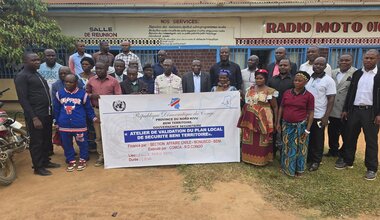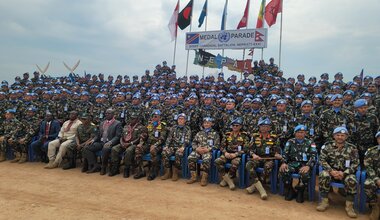Leila Zerrougui on working visit to Goma and Kisangani
Goma, 7 August 2010 - The United Nations Secretary-General's Deputy Special Representative in the Democratic Republic of Congo (DRC), Leila Zerrougui concluded on Friday, 6 August 2010, her 72-hour stay in the eastern North Kivu and Oriental provinces, where, among other things, she looked at issues regarding the security of populations, especially in mining areas, and the functioning of the justice system.
In Goma, the provincial capital where she arrived on Wednesday, 4 August 2010, Leila Zerrougui had working meetings with MONUSCO civilian and military officials, and with provincial authorities and local civil society representatives.
With MONUSCO officials in Goma, discussion points included issues regarding the functioning of MONUSCO and its mandate which emphasises stabilisation and the protection of civilians in North Kivu province. On Thursday, accompanied by a sizeable delegation including the province's Vice Governor, Leila Zerrougui travelled to Rubaya village in Masisi territory, about some 60 kilometres northwest of Goma, to visit the mineral trading center established there. The project to establish such mineral trading centres in the region was initiated by MONUSCO in partnership with the provincial Government, and the aim is to monitor mineral transactions and ensure that the trading chain of the minerals in Masisi is traceable.
At Rubaya, in the presence of civilian and military authorities, local chiefs and a large crowd of local people, the Deputy Special Representative spoke at length on the importance of this project for local populations. Those who work in the mines, Leila Zerrougui noted, are the populations, and often they do so in difficult conditions. And that is why, she said, this mineral trading centre project must benefit them. In particular, Leila Zerrougui urged the local authorities to ensure that all necessary conditions are met for the project's success. These conditions, she said, include security, transparency, the absence of a parallel administration and the attendant illegal taxes, and more important, ensuring that the minerals do not originate from armed groups, or any illegal trading chain. The international community, including MONUSCO, will have the right to inspect the project, Leila Zerrougui said. But she added that the project's success will ultimately depend on the involvement of the Congolese authorities and populations.
Her call was echoed by the provincial Vice Governor, who appealed to the population for better cooperation to make the project a success. The population, for their part, complained of multiple cases of harassment from non-integrated police elements present in the area of Rubaya, including Kibati (some 7 kilometers from Rubaya).
The Deputy Special Representative next went to Kisangani, in Oriental Province, where she was briefed by MONUSCO civilian and military officials on the security situation, the functioning of the justice and prison system, as well as on issues relating to the protection of civilians in the province, where thousands continue to suffer grave human rights abuses. Issues regarding the organization of the future elections were also broached as well. In particular, MONUSCO Kisangani officials drew attention to the climate of insecurity prevailing in Bas-Uele district, following the influx of displaced persons from Ango territory, fleeing the presence and exactions by LRA elements. They stressed the need for maintaining the MONUSCO temporary operating base (TOB) in Dinguila (200 km from Buta, in Mambessa territory) and for re-opening the MONUSCO military observers' office in Buta (Bas-Uele district), which has been closed after being ransacked in June 2009. Ever since, there have been no UN flights to Buta. As a result, MONUSCO and humanitarian agency missions to this sector have occurred on an irregular basis, despite serious human rights violations being committed there.
Taking serious note of the situation and recognising the need to step up the fight against impunity in the province, Leila Zerrougui announced plans for MONUSCO to establish a high committee for civilian protection management, in charge of monitoring violations committed by soldiers from all sides, whether FARDC or militia members.
 UN
UN United Nations Peacekeeping
United Nations Peacekeeping






